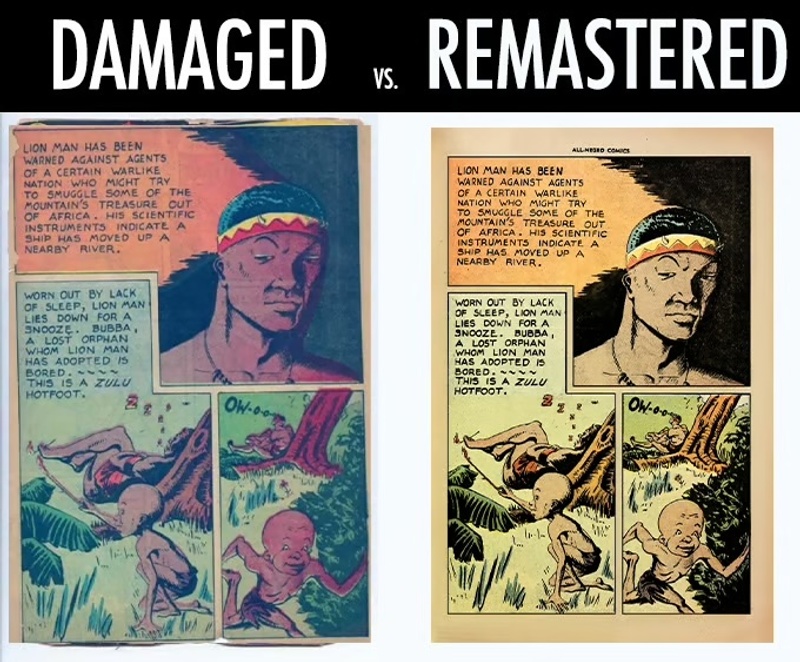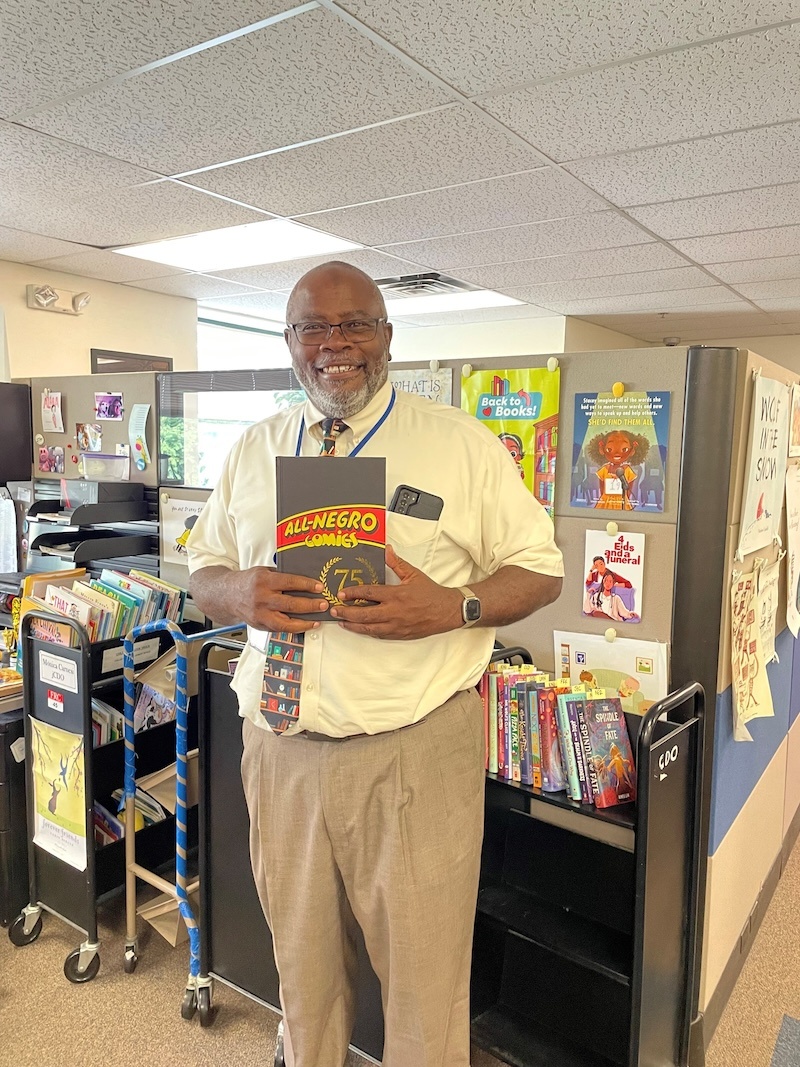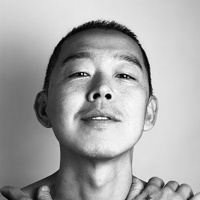On finding the ideas that stick with you
Prelude
Chris Robinson is the writer of Vince Staples’s Limbo Beach, the Werewolf Frankenstein series, as well as the editor of the Eisner Award-winning All-Negro Comics 75th Anniversary Edition. Formerly, he edited Black Panther, Moon Girl and Devil Dinosaur, Ghost Rider, and much more for Marvel Comics. Learn more at CROB.info.
Conversation
On finding the ideas that stick with you
Comic book writer and editor Chris Robinson discusses why he doesn't have imposter syndrome, getting work out into the community, and the importance of anthologies.
As told to Sam Kusek, 2621 words.
Tags: Comics, Writing, Editing, Collaboration, Process, Success, Inspiration.
Congrats on the Eisner win for All-Negro Comics 75th Anniversary Edition. How does it feel to have a project like this recognized in that way?
It is still very indescribable. I’m still processing it. As much as I appreciate everyone sort of directing the thanks and congratulations to me, I also always want to take this opportunity to try to redirect that to all the folks that worked on the book with me, Tony Washington, who did the coloring, and obviously the original creators. I always, always, always want to kick back to them. It was the whole reason we did the thing. It is an honor and I’m still working through it basically.
It’s an interesting feeling to win something and in a way be the face because in a lot of ways you’re the face of the project and the face of the effort to bring it back, but not necessarily the creator. There are other people who are involved in that. It’s an interesting balance to strike of making sure that you’re passing on the right amount of recognition, but also not resting your laurels, being confident in your win, but not resting your laurels on it.
To that end, how has winning an award of this scale impacted you personally? You’ve been in comics for a while now. Did you walk away from this with more wind in your sails, with a confidence boost? Are you like, “Great, I won an Eisner,” and now you’re like, “And here’s all the other shit that I need to do,” and just sort of going back and focusing on the work? Where is your head at?
Confidence is a funny thing. I’ve never actually ever had the problem of needing more of it or needing to work myself up like, “Can I do this?” I’ve never really had Imposter syndrome.
You’re lucky. I don’t think that’s a common experience for people in comics.
Absolutely, it’s a thing that a lot of creators discuss and I’m glad for that, but I personally have never identified with that issue. Still, I haven’t seen any big impact or offers. Nothing has come out of the woodwork to surprise me as a direct result of that win just yet. We’re getting low on the stock of the first printing. Then, it’s sort of a question mark as to what happens beyond that. Obviously, I don’t want it to fall out of print. That’s another reason we did it, for it to be in print and available places, but it is in print and available places. I’ll have to figure out what the next steps are to keep it in print “in perpetuity” as they say.
I get that. It’s not really the climax. You did the campaign, and it was successful. You’ve had a good release. You’ve won an award, but the book is still out there still being circulated. It’s not the end, but there is sort of this undetermined future for it. Let’s talk a little bit more just about the process of the book for those people who didn’t follow along the journey of the campaign. What was the process of bringing this historical book back to life? What was the remastering process like? I know that was a big part of the campaign.
This was tough because I’d never been into “old” comics. You know what I mean? Golden Age comics are sort of new territory for me in general. There was a long period of educating myself as to what people expect in this category, reading a lot of Dark Horse Creepy Archives and that type of stuff, and looking at un-remastered old comics, looking at the Marvel and DC Golden Age reprints, seeing how everyone in this space, in this market, tackles this kind of project. It was a lot of reading!
I did also try to—and it’s tough because it’s very out of print and very hard to find—but I tried to find as many different scans of ANC #1 as I could to sort of determine what was a defect that is just in the copy that I’m looking at versus other copies—did they all have a certain scratch in a panel? If that’s in every copy, I want to keep it. That type of thing.
Right.
That’s a very, very small sample size, but that was part of the process. That was my part, but then the real work of it all doesn’t begin until we kick it over to Tony Washington. He went in and did a lot. He sent me one of the Photoshop files where it’s very layered, a lot of separations. He redid the blacks, probably the most important addition for true readability since all the text is in black. We recentered every page so it was a standardized thing. That way there was sort of uniformity throughout for the reading experience in the book, which I think that’s a necessary thing. I’m trying to think of what else detail-wise we kept, but it was a lot. Tony deserves all the credit for getting it to where it needed to be.
Under every page is sort of a yellowed paper texture because we never wanted it to feel like something that was printed yesterday. We’re not trying to hide the fact that this is from 1947. With the title All-Negro Comics, I think you can’t run away from the fact that this is old. But the paper texture trick was something I learned from working on Ed Piskor’s X-Men: Grand Design books. When you look at some of the Marvel and DC reprints, they would print them on clean white paper and working with Ed was the first time I understood how anachronistic that is.
I was going to say it’s so interesting hearing about the minutia of what do we do to not in a way modernize this, but, like you said, restructure it or re-stabilize it for readability and then still keep the historical integrity of it? That’s such an interesting balance to strike because I’m sure you have to really be particular about the calls that you make. It’s cool to hear about that. I don’t have as much insight into that process.
Me neither! This is a learned process that I don’t know that I’m going to do again. It’s very unique and it’s kind of a one-off. I will say one thing. Me and Tony talked about the process at length in one of our project updates. So, our backers were aware of what was going into it while it was being worked on, which was very cool, and I think a lot of them appreciated that information.

Side by side comparison of a typical page of All-Negro Comics #1 versus the corresponding remastered page in ANC75.
It’s cool to hear that people were so receptive to it. You touched on it a little bit. Now I’m like, “Oh, I wonder what kind of answer will come out,” but are there any other hidden pieces of comics history or comics culture that you feel deserve a similar remastered treatment? I’m thinking of, I don’t know how familiar with Bubbles you are, the magazine.
No, what’s that?
Bubbles is a magazine out of Richmond, Virginia. They’re a real just comics culture magazine, but the reason I bring them up is they’ve recently been doing releases of pre-World War II manga. It’s kids sports manga, specifically Bat Kid and Igaguri, both of which I really love.
I don’t think it’s at the same scale as All-Negro Comics, but it’s great to see that stuff come out in a more modern format that you wouldn’t really get through a VIZ or a TOKYOPOP or a Vertical Comics. I’m wondering if you have anything else that you personally are interested in, maybe not slated for another project, but you’re like, “Oh, man, I’ve always loved this aspect of comics culture, and I’d love to see somebody bring it to the modern age.”
I’m not a historian. I don’t look at old comics that frequently. It’s really by chance that I even stumbled upon All-Negro Comics #1 in the first place. But looking at that era, I think that it would be super cool to see Voodah, which is this Matt Baker comic, a jungle guy type of superhero comic. There’s not that much of it as far as I know. A very funny thing is that the character was colored with a Caucasian skin tone on the front covers and then he was Black in the interiors, which I think is hilarious. I think maybe that would be one thing I would fix if I oversaw a reprint. I would say he should probably just be Black the whole time.
I think Voodah would be super cool. I don’t know. With comics, there’s just so much out there that I don’t know about. You know what I mean? This Bubbles thing, I just Googled it very quickly. That’s super cool. I am glad that there are folks out there digging stuff up and resurfacing it. That’s how ANC75 happened. I saw the original. I was like, “Man, this should be resurfaced.” Then 10 years went by, and nobody did it, so I did it myself.
I think that’s my favorite attitude of creative professionals. I mean I think it got a little ruined by the Thanos meme that goes around, but it’s like I’m just going to do it myself. I’ve had similar projects like that where you’re like, “Oh, this thing doesn’t exist. Guess I have a new project or a new creative job that I’m going to do.”
It’s great to be able to see more of that stuff come out and have it been well received because it just gives you fire to do more or it’s the proving ground that I can do this. It gives you license to be very particular about the things that you want to do because when it feels special and genuine then it actually, I think continues to just prove to be a successful thing rather than it being a cash grab for the sake of just doing it.
100%, my big struggle is “Am I excited enough about this to spend the time and effort to do it to my standards?” You know what I mean? That’s a short list. I’ll have ideas all the time where I’m like, “Oh, that’s cool,” and I’ll write it on my board. Then, two weeks later I’m like, “Never mind.” Are we excited enough about it to do it? That’s a big question to me.
One thing I loved about the campaign was the focus on giving back to the community. Your rewards gave backers the ability to not only get a book up, but to send a copy to a local school, prison, or detention center. What kind of response have you gotten from those communities who’ve received copies?
This was a much more popular reward than I thought it was going to be. It ended up being 500 copies and then when I started looking into sending the book beyond the handful of places that I already had connections to it was like, “Oh, wow, this is much more complex than I gave it credit for.” There are a lot of rules about donating books like this. Actually, I had to start getting help from librarians pointing me to the way of like, “Check this place out. Here’s this organization,” that type of thing.
I think the one I’m most proud of is the Philadelphia Free Public Library System. I was able to send them all copies. Every branch in Philadelphia has a copy, which is great because ANC comes from Philadelphia.
That is probably the one that I’m most happy about, but it was a great idea. I’ve seen other campaigns since grab the idea. Hey, if your book fits the bill, do it. Get it out there and get it into these places.

Kelly Richards, President/Director of the Free Library of Philadelphia holding a donated copy of ANC75.
I agree. I hope the people who read this interview, that is one of the big takeaways coming out of this. I do think there’s a lot of opportunity. It’s not really education so much as it is just like awareness, continued cultural awareness, just continued exposure, not for the sake of money and sales. I always think about when I come from a retail perspective or I am just thinking about where books end up the unknown, unknown customer.
Who is the kid or the adult who’s going to find this who knows nothing about it who’s really excited about it? They’re the people that I’m always thinking about. It’s just like, “I got to get this out there for them. I don’t know who they are or what they need, but this is going to change somebody’s life and it’s important that it’s there.” Getting it into schools and libraries, man, the Philadelphia Free Public Library System, that’s huge. What a great get.
The last question I had for you, Chris, is you have quite the storied career with one of the big highlights being you created the first Marvel’s Voices anthology comic series. That’s still running today as far as I can see. What is it about anthologies that you think works so well across comics?
I mean comics start with anthologies to some degree. Even today, although they never really went away, people like to say they don’t sell. I think on Kickstarter specifically, it’s a great way to share the journey.
Every individual comic is a group effort, but then anthologies are just a multiplier of that. In terms of breaking in, if you’re getting started–my first comic that I produced myself with Kickstarter was Fearless Future, which was a sci-fi/horror “Black Mirror” short stories type of thing—That’s a great place to start.
Also if you’re not cutting your teeth and you’ve been in the industry for a long time, it’s a nice way to get a little taste of something different—experiment. Do a little story that you’re not committing an endless amount of time to because comics are, as we all know, very time consuming to make. It’s kind of like, “Hey, we’re just going to do eight pages. That’s it.”
I think that’s what makes anthologies the best. We’re all making a comic together and you have your chocolate. You have your peanut butter. You have your rainbow whatever, so many different flavors. I personally love anthologies. Anytime I see an anthology out there, I am predisposed to give it a shot.
Anthologies, man, I can’t say enough good things about them. Back in my Marvel comics days, I would always look at the other short stories collections and just see who’s interesting—who’s got something to say?
Anthologies, they’re super fun and don’t take them too seriously, but also, they could lead you to bigger and better things very quickly.
Chris Robinson Recommends:
Here are some books that I have (repeatedly!) revisited in the past to be re-inspired by the power of comics! Worth reading in any format but I highly encourage seeking out the deluxe editions for the supplemental making-of materials.
The Rocketeer: The Complete Adventures Deluxe Edition
Scalped: Book One Deluxe Edition
Absolute All-Star Superman
X-Men: Grand Design Treasury Edition
Wednesday Comics
- Name
- Chris Robinson
- Vocation
- writer, editor
Some Things
Pagination



